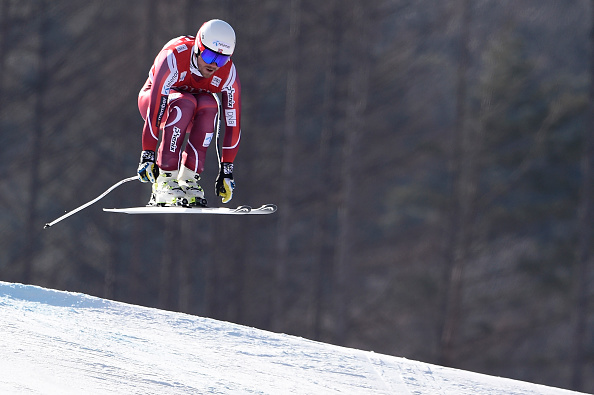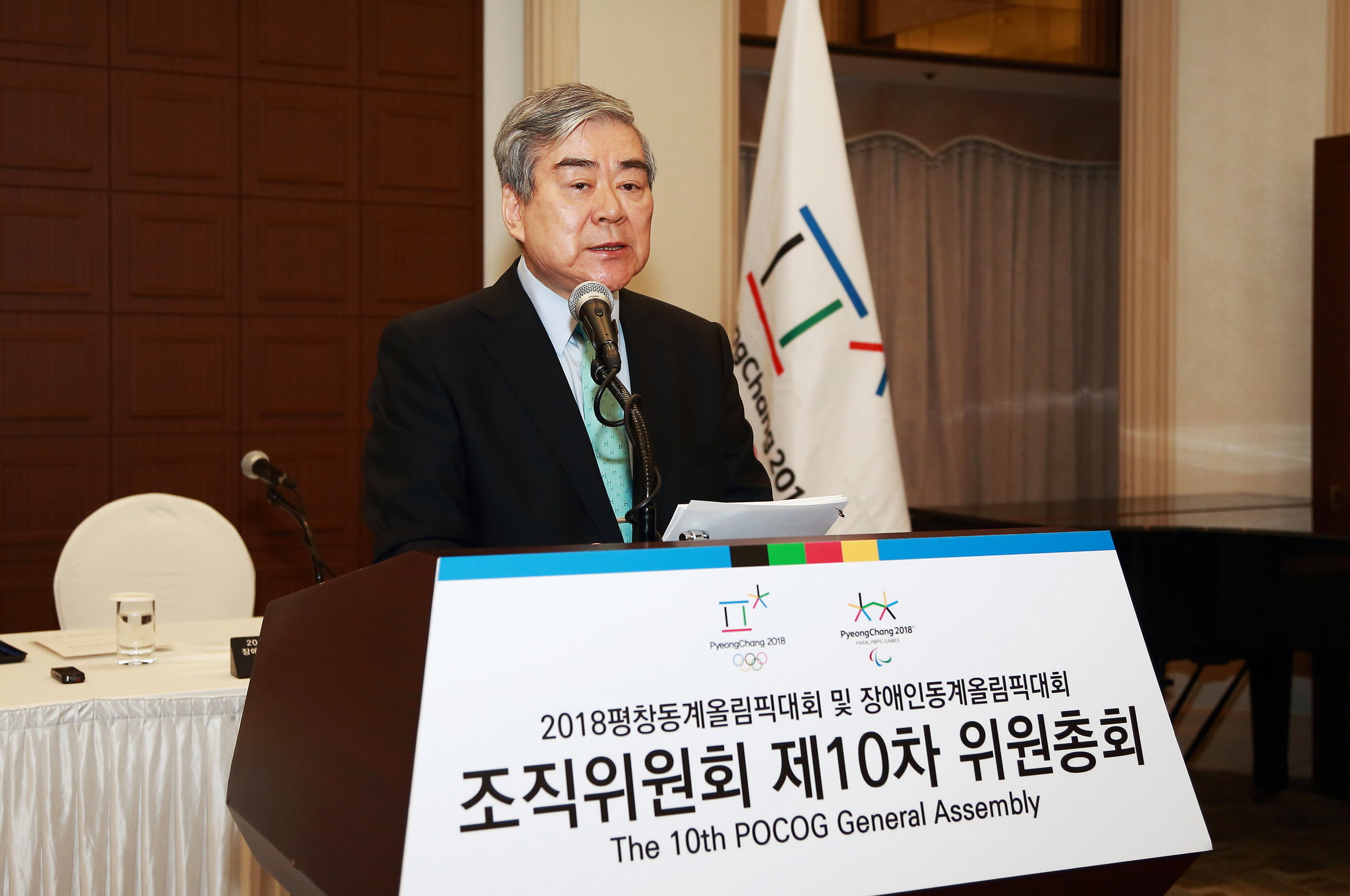PYEONGCHANG, South Korea — Think Olympics, and with the Rio 2016 Summer Games coming up in just six months, the headlines are dominated by story after story of bad water, ill government, sick finances and, now, the Zika virus.
Just 18 months after the show closes in Rio, the Olympic spotlight will turn with all its intensity to the 2018 Winter Games, here in South Korea. So now for some glad Olympic tidings, the evidence manifest this weekend in the first 2018 test event, a men’s World Cup alpine downhill: Korea is emphatically on track.
Before most every World Cup race, the U.S. Ski Team sends to reporters a sort-of inside-baseball guide to what’s what -- notes, facts, figures, impressions. Here is a snippet from Saturday, before the downhill: “They say you never get a second chance to make a first impression,” adding, “Based on athlete praise this week, it looks like Pyeongchang crushed it with flying colors.”



Big picture, the 2018 Games are on target to become one of perhaps the most memorable ever, situated in a hamlet where, because of simple geography, there’s going to be a Lillehammer-like village setting — assuming the Koreans can, as they have promised, bring the village to life. Too, because Pyeongchang itself is a ski venue and the skating and other ice venues are down by the coast in Gangneung, maybe a half-hour away, the 2018 vibe is going to be heavy on ski and snowboard — the very disciplines the International Olympic Committee has sought to use to reach out to a younger audience.
To that end, the IOC has approved for 2018 a snowboard event called "big air" that features, naturally enough, huge jumps.
The Jeongseon alpine racing course on Gariwang Mountain, designed by famed designer Bernhard Russi, the 1972 Sapporo Games downhill champion, and set by Hannes Trinkl, the 1998 Nagano Games downhill bronze medalist, runs to about 1.7 miles, with blind jumps and four pucker-inducing, great-for-TV jumps.
For comparison: the downhill track takes about 25 seconds less to get down than the 2:06.23 it took for Austria’s Mattias Meyer to win in Sochi in 2014. Because it's shorter, it places a huge premium on precision and control.
Norway's Kjetil Jansrud, who had been crushing it all season and all week in training, went 1:41.38 to win Saturday's race, his third victory of the season. Italy's Dominik Paris surged to second, two-tenths of a second back, in 1:41.58. American Steven Nyman, also strong in training, placed third, in 1:41.79, 41-hundredths behind. For Paris and Nyman, the race marked their first podium turns of the season.


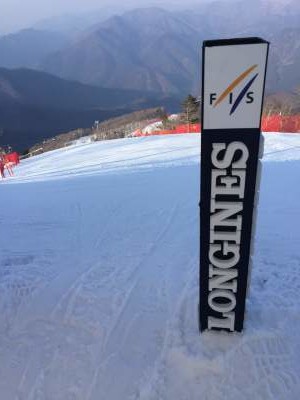
Sunday will see a World Cup super-G. The women's World Cup tour comes to Jeongseon in March 2017. In all, Pyeongchang will stage 28 test events over the next two years.
For a long time, it was hugely doubtful that the Koreans could have done what they did this weekend. Pyeongchang won the 2018 Games in 2011; the first three years went by with not enough getting done.
Then, though, Yang Ho Cho, the Korean Air chief who led the winning bid, was brought back — at the urgings of the highest levels of South Korean government — to run the Pyeongchang organizing committee, which goes by the acronym POCOG.
Now:
All major construction projects are on time, including a high-speed Seoul-Pyeongchang rail line and the athlete and media villages. Sponsorship: picking up. Right on schedule, the organizing committee is moving away from planning and toward operations.
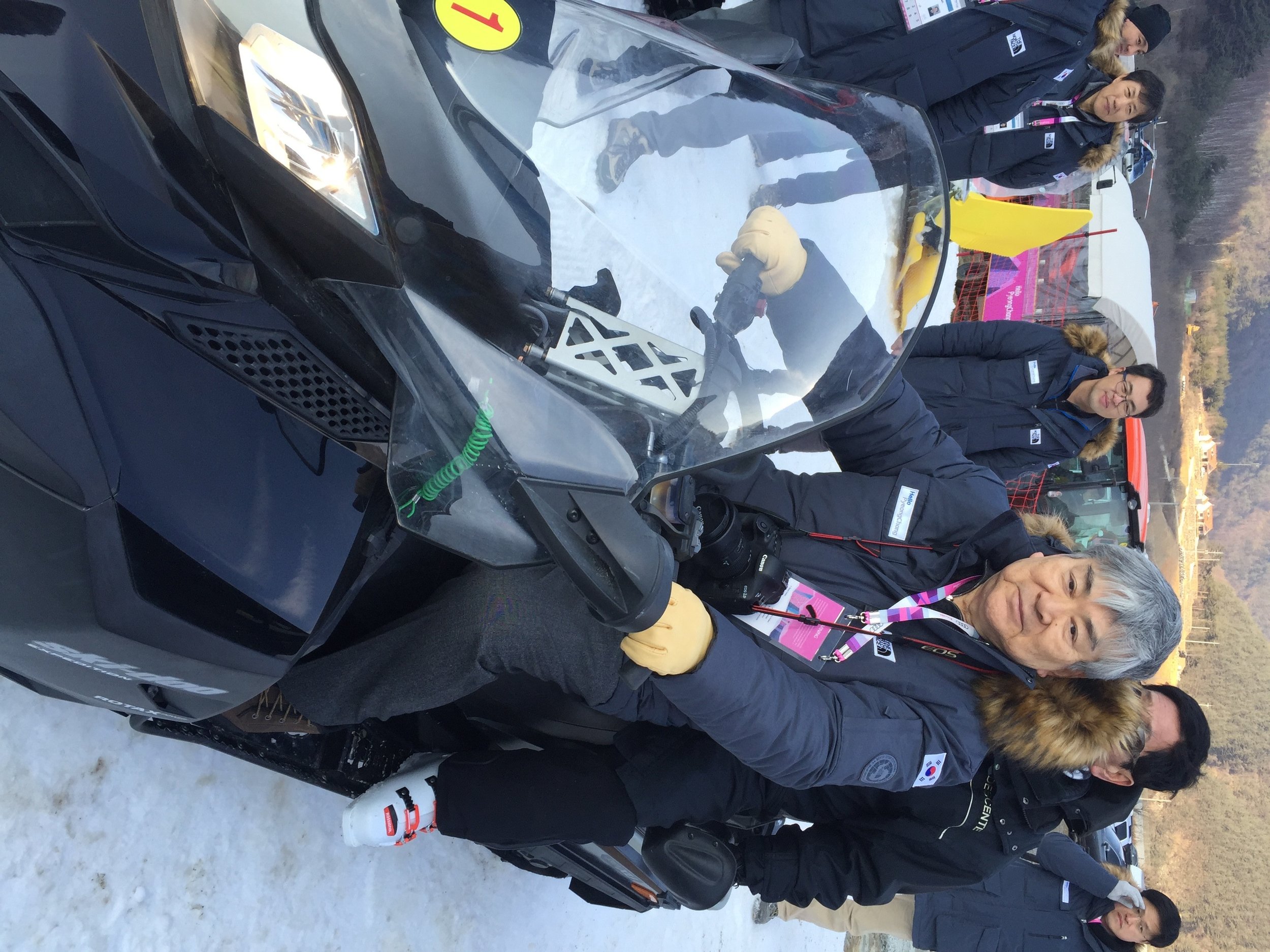
Gunilla Lindberg of Sweden, the International Olympic Committee 2018 Games coordination commission chair, said Saturday at a post-race briefing, "Today, for example, would not have been possible without the commitment of Korea to keep its promise to the athletes and to the Olympic movement."
There’s a long way to go, of course, before 2018, and any number of things can and probably will happen. After all, running an Olympic Games is nothing if not an exercise in crisis management.
Because this was a test event — the entire purpose of which is to find out what works, and what doesn’t, and get right what’s wrong — there inevitably were some rough edges over the weekend. Transport, parking, venue access — they all need to be reviewed.

Because it’s the Olympics, questions of legacy — what to do with this run after 2018, say — are bound over the coming months to gain in urgency. It doesn’t take much to figure out that, after the Beijing 2022 Winter Games, the international ski federation, FIS, can put together an Asian circuit, with races in China, Japan and Korea. Typically, though, ski runs are part of mammoth resorts. This is — a ski run. There are no glowing fireplace embers in the lodge because there isn’t a lodge. Or much else.

That said, the very fact that the races went off, as scheduled long ago, is the most important take-away from the weekend. It makes for a huge momentum blast for 2018.
Before this weekend, the Olympic world was asked to believe, without evidence, that the Koreans could put on not just a world-class winter event but, with the downhill, one of the marquee events of the Games. Now that evidence is indisputable.
"It was a hard work," said Sarah Lewis, the British secretary general of FIS, the international ski federation. "And it was a great work."
If it was an organizational and logistics race to the finish, that is all the more evidence, too, of first-rate leadership and with it the building and sustaining of a winning culture — one where everyone buys in because the boss is right there with them, demanding excellence of himself and everyone around him.
“It’s not about me,” Cho said in an interview. “It’s about the team.”
For sure, and yet it is in some significant measure about him, because over his career he has proven an extraordinary change agent, the business leader who can bring teams to hew to his vision, who can command respect in political and financial circles, who moves easily in eastern culture and, as well, in the west.
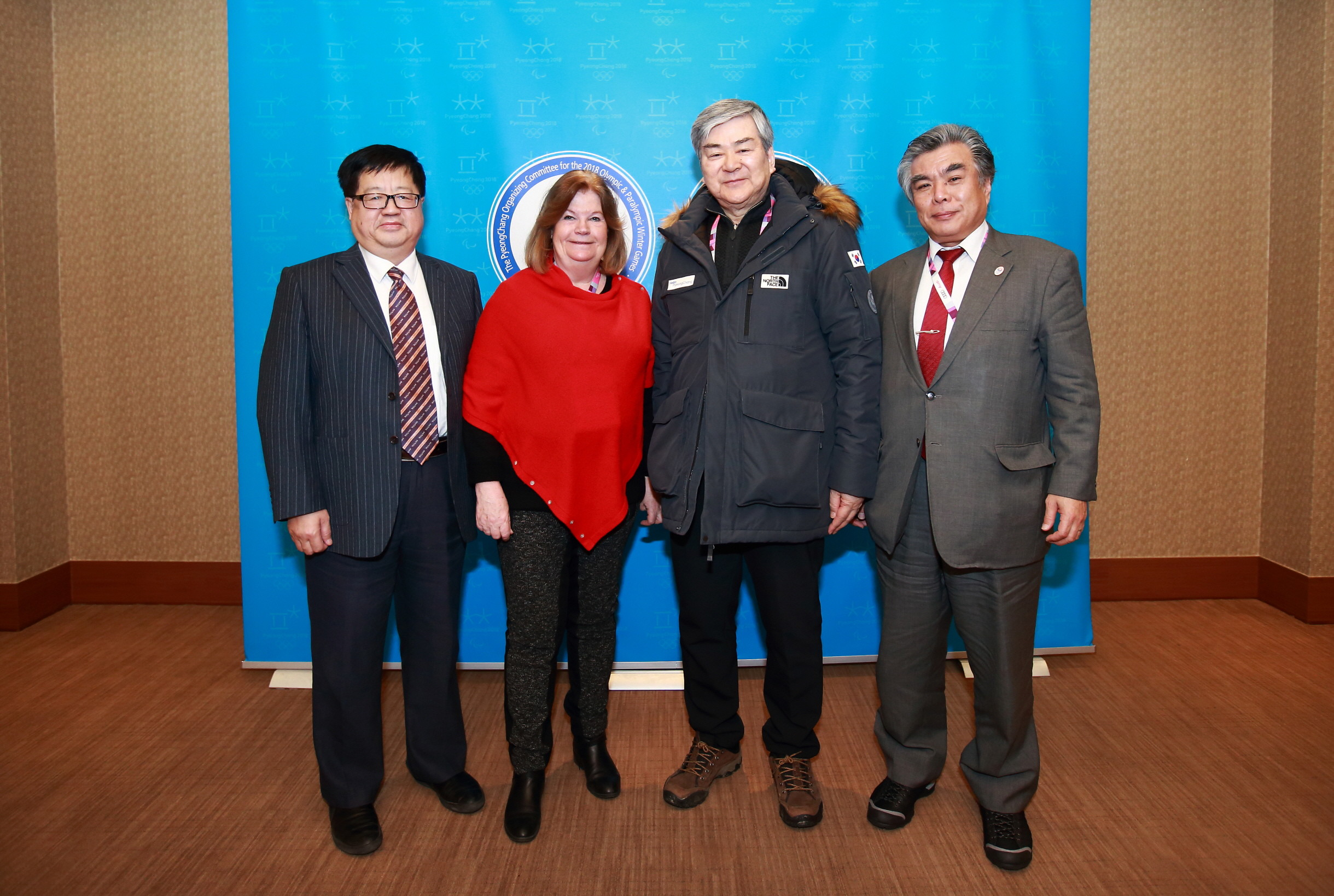
From the first day he came back to the Olympic scene, in the summer of 2014, Cho understood the symbolic import of bringing this first test event in on time.
It was pretty elemental: Korea had been trusted with the Games. Now, could Korea deliver?
Cho has for many years been one of the world’s leading experts in enterprise culture, that thing that is exceedingly difficult to define and to make real but is so very real, indeed infectiously obvious, when it comes to life.
— As is detailed in Malcolm Gladwell’s 2008 best-seller “Outliers,” Cho effected a huge cultural change at Korean Air after the 1997 crash in Guam of Korean Air 801, which killed 228 passengers and crew. Afterward, junior pilots were encourage to speak up to senior officers; before, even in the face of potential disaster, that same junior pilot might well have simply shown deference. Too, all pilots had to become proficient in English, the language of international aviation.
Korean Air’s safety record since has been impeccable.
— Pyeongchang bid for the 2010 and 2014 Games, losing both. Those bids were headed by the provincial Gangwon governor, Jin Sun Kim. Cho led the 2018 bid. It not only won but by one of the biggest landslides in Olympic voting history, Pyeongchang getting 63 votes, Munich 25 and Annecy, France, just seven. Those 63 votes marked the highest-ever total for a first-round bid; Salt Lake City had gotten 54 for the 2002 Winter Games.
— Kim, a former provincial Gangwon governor, took over as organizing committee chairman. In July 2014, he unexpectedly resigned, saying new leadership was needed. The South Korean government turned to Cho, who initially turned down the job but then relented, saying it was a matter of duty, conscience and public service. His Olympic work -- which now takes up most of his days -- is without salary.
It took a little time for Cho to figure out who in POCOG was a worker and who, well, not. One of Cho’s first directives, considering that more than half the organization came from government: if you are working for a ministry and you don’t want to stay until 2018, the moment to leave is now. This way he had people who were in, and for the long haul.
It took time for Cho to convince the IOC that he — not the background noise drip-dripping from government — was really in charge.
In March, 2015, South Korean President Geun Hye Park’s chief of education and culture got with Lindberg, the IOC 2018 commission chair. The two-pronged message: the central government was fully supportive of the Games and Cho was indisputably in control.
Time, too, to get the various interests in POCOG — there are over 60 constituencies, including the private sector plus federal and Gangwon provincial government ministries — to learn to talk across the separate silos they had over the first three years constructed.
Then there was the weather. Korea normally goes through a rainy season. But summer 2015 brought a lot of rain. That meant a lot of mud on the mountains. That meant construction delays.
By last December, it was entirely unclear whether the gondola up Gariwang could be done in time to meet the required FIS Jan. 20 check-off, officially called “snow control day.”
Without the gondola, there was no point in seeing whether the other check-off due that day — snow volume and quality — could be met.
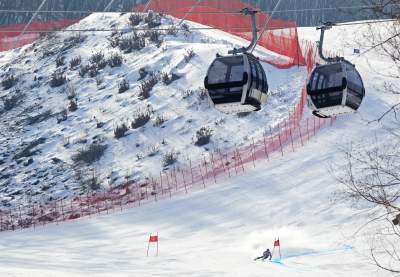
Thus the back story to this weekend.
The gondola, and how it got done, would prove hugely emblematic.
Cho had to be in Europe the first week of December for meetings, one of which revolved around his role in international aviation.
By then, POCOG had been told by officials of the gondola maker, a company called Doppelmayr, that the Jeongseon project was unsafe. No way it would be ready by Jan. 20. But that assertion didn’t elaborate.
On Dec. 6, a Sunday, Cho met in the lounge of a private aviation terminal near Vienna with Michael Doppelmayr, the company’s chief executive officer.
Doppelmayr told Cho that the firm’s No. 1 priority was safety. He said it had had 130 ongoing projects around the world.
For his part, Cho said, I have 150 aircraft that fly to more than 100 cities around the world, and Korean Air has the lowest insurance rates in the business.
That did it. At that instant, the two men recognized they were equals — sophisticated international businessmen.
The issue, as it would turn out, was that some of the pillars in the middle station planted on the Jeongseon run were misaligned. Without that alignment, the gondola wires and, obviously, any cable cars wouldn’t work right.
Cho told Doppelmayr the project had to get done.
For his part, Doppelmayr promptly sent a team of senior engineers to Korea. It was one thing to look at photos. It was quite another to be there, on scene.
After that, things swung into action. Crews worked 20-hour days, seven days a week. Christmas and New Year’s holidays? Not a chance. Work.
Meantime, on Dec. 24, Cho attended a POCOG executive board meeting. Hoarse, he could barely scratch out a few introductory remarks.
The important thing was that he was there. If everyone on the hill was working around the clock, he — despite the fact that he actually went to the hospital later that evening, where he was treated with antibiotics and released — was keeping a killer schedule, too. He wasn’t asking anyone to do what he wouldn’t do himself.
It got noticed.
On Christmas, everyone working on the hill enjoyed a traditional Korean barbecue. Cho paid for it himself — that is, himself, not from organizing committee funds.
Intriguingly, the weather in Korea — like in a lot of places now — had been unusually warm. The week before Christmas, as if by some magical confluence of karma, it turned cold, exactly when the Koreans needed it. Now they could make, and store, snow.
The week before the Jan. 20 deadline, the Koreans had made enough snow.
They kept going. By race day Saturday, they had 120 percent of the snow amounts the course requires.
Come deadline day, it was all good. The snow. The gondola, working, got certified.
Then came the raves.
And, come Saturday, the downhill. And more raves.
At that post-race news conference, Lindberg gave the event a score of 100 out of 100, bringing gasps and applause from Korean journalists. In a visit in December, she explained, IOC and other officials assuredly had "some doubts this event would take place." Even so, she said, "We trusted President Cho's promise," adding, "He made the impossible possible."
Echoed Gian Franco Kasper, the FIS president, "President Cho made us a promise and he really kept it," adding, "You have seen it today. We have an excellent downhill course here, according to the athletes and the coaches ... it's a beauty."
Jansrud, calling the mountain "fun," said, "This is more than an acceptable Olympic venue to ski on." Paris: "We can ski and we can have a lot of fun here." Nyman: A "joy to ski."
The FIS technical expert, Günter Hujara, had said earlier in the week, “Nobody believed we could do it but we did it.”
Or, as Cho said in a briefing Friday with a few reporters, “We had promised to deliver, and we delivered. Korea can deliver.”








